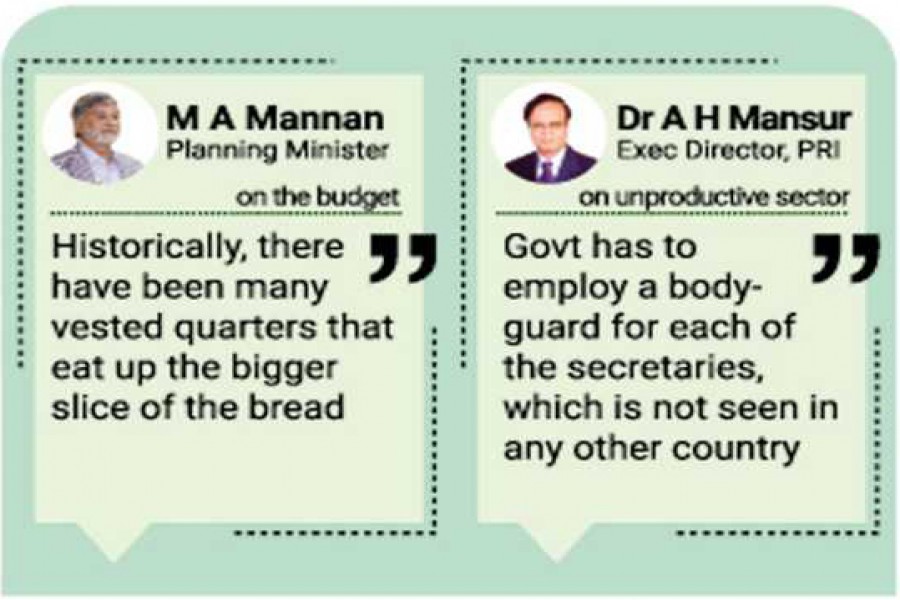Political influence gets precedence over necessity in budgetary allocations, thus hindering the development process, says Planning Minister M A Mannan.
"Allocation (in budget) is more of a political-economic issue. The government while making allocations has to make some compromises," the minister told a pre-budget meet Saturday.
"Historically, there have been many vested quarters that eat up the bigger slice of the bread," he says in metaphorical terms.
He says the government cannot change everything overnight but it is trying to improve the situation.
The minister was addressing a roundtable discussion on 'Macro Economy: Expectation from national budget 2022-23', jointly organised by the Institute of Chartered Accountants of Bangladesh (ICAB) and the Economic Reporters' Forum (ERF) at the ICAB headquarters in Dhaka's Kawran Bazar.
Acknowledging the necessity of reforms in various sectors of the country, Mr Mannan said, "There is a serious need for bringing reform in the NBR (National Board of Revenue) that I frequently talk about."
The planning minister also underscores the need for reducing expenditure in unproductive sectors in order to make the most of people's tax money.
Speaking on the occasion, Executive Director of the Policy Research Institute (PRI) Dr Ahsan H Mansur said ahead of preparing the budget, an analysis of macroeconomic context was important.
The economic recovery from the pandemic fallout is visible in many indicators like rising import and export volumes, yet the impact is apprehended in other indicators, he adds.
The economist criticised the higher expenditure of public money in unproductive areas like privileges for the top bureaucrats.
"The government has to employ a bodyguard for each of the secretaries of the government, which is not seen in any other countries, as far as I know," he told his audience.
Even they are equipped with shiny foreign cars whereas the bureaucrats in India and Pakistan use their locally made vehicles, he says, citing an example.
Various subsidies and unscrupulous expenditure take a huge toll on reaping real benefit from the national budget, notes Mr Mansur, who had once served in the IMF.
Highlighting the need for reforms in the tax regime, he says there should be a mechanism so that there could be no direct communication between taxpayers and taxmen.
He also put emphasis on green growth for a sustainable economy, job creation, housing for all and timely implementation of megaprojects.
In his speech, ICAB President Md Shahadat Hossain said the ICAB had already submitted its proposals for the upcoming budget for the fiscal year 2022-23.
"Currently, the country's tax-GDP ratio is only 8.9 per cent which should have been at least 20 per cent," he says.
In an effort to stabilise the macro economy, there is a crying need for shrinking the expenditure in the unproductive sectors, he adds.
Chairman of Chittagong Stock Exchange (CSE) Ltd Asif Ibrahim called for reducing corporate tax and incorporating small and medium entrepreneurs in the stock market.
President of the Metropolitan Chamber of Commerce and Industry (MCCI) Md Saiful Islam suggests revisiting the eighth five-year plan as there have been many changes in economic assessment of different areas in the wake of pandemic.
Mr Saiful also calls for providing all export-oriented sectors with the similar benefits enjoyed by the apparel sector, in order to facilitate export diversification.
Former president of Dhaka Chamber of Commerce & Industry (DCCI) Abul Kasem Khan finds the country's tax regime a complex one.
"The taxmen should be properly trained - they also need to change their mindset," he adds.
Other speakers also opined that the country needed major reforms in its tax regime and financial sector to ensure a feel-good macroeconomic environment.
Timely completion of mega infrastructures projects, export diversification, and creating new jobs through skill development are also highly important for the country, they added.
The panel of discussants included former adviser of caretaker government Rasheda K Choudhury, Chairman of Dhaka Stock Exchange (DSE) Md Eunusur Rahman, ERF President Sharmeen Rinvy and its General Secretary S M Rashidul Islam.
Former president of the ICAB Humayun Kabir moderated the discussion.


